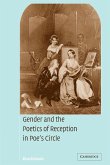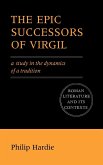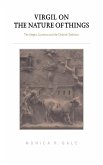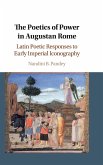Examines the ideological reception of Virgil at specific moments in the last two millennia.
This book is an examination of the ideological reception of Virgil at specific moments in the last two millennia. The author focuses on the emperor Augustus in the poetry of Virgil, detects in the poets and grammarians of antiquity alternately a collaborative oppositional reading and an attempt to suppress such reading, studies creative translation (particularly Dryden's), which reasserts the 'Augustan' Virgil, and examines naive translation which can be truer to the spirit of Virgil. Scrutiny of 'textual cleansing', philology's rewriting or excision of troubling readings, leads to readings by both supporters and opponents of fascism and National Socialism to support or subvert the latter-day Augustus. The book ends with a diachronic examination of the ways successive ages have tried to make the Aeneid conform to their upbeat expectations of this poet.
Review quote:
" As a whole, Virgil and A ugustan Reception is persuasive, forceful, and impressive. It displays the intelligence and fritical daring to which readers of T.have grown accustomed and takes a broad view that will be salutary for Classicists and will attract scholars in other fields (most of the latin in the is translated). The book ought to be read by all interested in Virgil and his reception and will make a significant contribution to Virgil studies."
Bryn Mawr Classical Review
"...a very valuable contribution to scholarship on Virgil."
Classical Outlook
Table of contents:
Acknowledgements; Prologue; Introduction: the critical landscape; 1. Virgil and Augustus; 2. Virgil and the poets: Horace, Ovid and Lucan; 3. Other voices in Servius: schooldust of the ages; 4. Dryden's Virgil and the politics of translation; 5. Dido and her translators; 6. Philology and textual cleansing; 7. Virgil in a cold climate: fascist reception; 8. Beyond the borders of Eboli: anti-fascist reception; 9. Critical end games; Bibliography; Index.
This book is an examination of the ideological reception of Virgil at specific moments in the last two millennia. The author focuses on the emperor Augustus in the poetry of Virgil, detects in the poets and grammarians of antiquity alternately a collaborative oppositional reading and an attempt to suppress such reading, studies creative translation (particularly Dryden's), which reasserts the 'Augustan' Virgil, and examines naive translation which can be truer to the spirit of Virgil. Scrutiny of 'textual cleansing', philology's rewriting or excision of troubling readings, leads to readings by both supporters and opponents of fascism and National Socialism to support or subvert the latter-day Augustus. The book ends with a diachronic examination of the ways successive ages have tried to make the Aeneid conform to their upbeat expectations of this poet.
Review quote:
" As a whole, Virgil and A ugustan Reception is persuasive, forceful, and impressive. It displays the intelligence and fritical daring to which readers of T.have grown accustomed and takes a broad view that will be salutary for Classicists and will attract scholars in other fields (most of the latin in the is translated). The book ought to be read by all interested in Virgil and his reception and will make a significant contribution to Virgil studies."
Bryn Mawr Classical Review
"...a very valuable contribution to scholarship on Virgil."
Classical Outlook
Table of contents:
Acknowledgements; Prologue; Introduction: the critical landscape; 1. Virgil and Augustus; 2. Virgil and the poets: Horace, Ovid and Lucan; 3. Other voices in Servius: schooldust of the ages; 4. Dryden's Virgil and the politics of translation; 5. Dido and her translators; 6. Philology and textual cleansing; 7. Virgil in a cold climate: fascist reception; 8. Beyond the borders of Eboli: anti-fascist reception; 9. Critical end games; Bibliography; Index.








